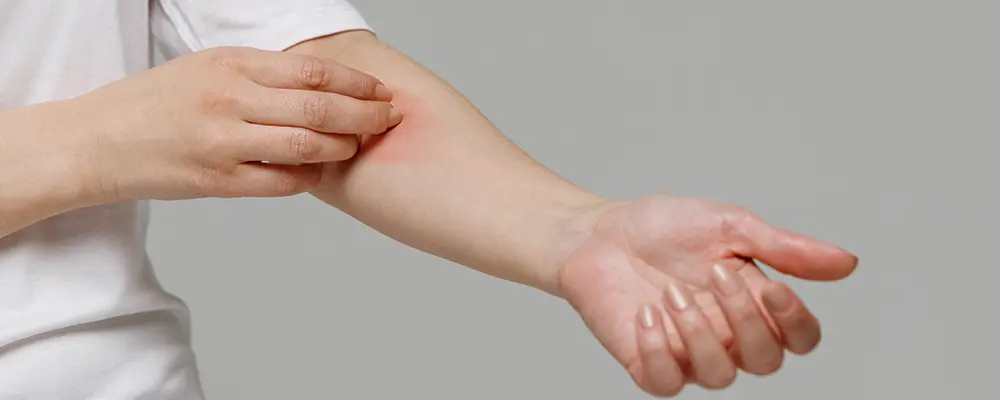Chronic Spontaneous Urticaria (CSU) markedly affects individuals with its unpredictable hives and intense itching, characterized by the frequent or intermittent appearance of wheals and subdermal swelling. Often paired with angioedema (build-up of fluid causing swelling), these symptoms occur without any identifiable cause.
This article aims to shed light on chronic spontaneous urticaria, offering insights into symptoms, causes, and effective management strategies.

More Than Just a Rash: All About Chronic Urticaria Symptoms
Chronic spontaneous urticaria is characterized by its unpredictable nature and the significant impact it has on daily life. Unlike chronic inducible urticaria, the welts associated with this condition tend to persist for longer periods but typically change shape or disappear within a day. They may also arise at specific times during the day.
Additionally, individuals dealing with spontaneous hives often report experiencing systemic symptoms including, headache, fatigue, joint pain, swelling, heart palpitations, and gastrointestinal discomfort.
Cracking the Code on What Causes Hives
The exact cause of this disease remains elusive, though it is believed to involve an abnormal immune response. In some cases, the body’s immune system mistakenly targets its tissues, releasing histamine (a chemical released by your immune system that may cause allergic reaction symptoms). However, there are several factors that may contribute to the disease, which are:
- Immune System Dysfunction: An overactive immune system plays a significant role in the development of CSU. The body may mistakenly identify harmless substances as threats, triggering the release of histamine and other chemicals that cause inflammation and itching.
- Autoimmune Disorders: In some individuals, this condition may be associated with underlying autoimmune disorders, such as thyroid disease or lupus. Autoimmune mechanisms may contribute to the chronic inflammation experienced in CSU.
- Triggers: Certain factors or triggers can exacerbate this disease symptoms in susceptible individuals. Common triggers include stress, heat, pressure on the skin, certain foods, medications, and infections.
Diagnosing Chronic Spontaneous Urticaria:
Chronic urticaria is identified by conducting a thorough history and examination; the diagnosis relies on a history of daily or episodic welts persisting for more than six weeks, with each welt lasting less than 24 hours, and in the absence of any physical triggers.
Diagnostic Criteria for Chronic Spontaneous Urticaria (CSU):
- Medical History: A detailed medical history is crucial for diagnosing CSU. Patients are typically asked about:
- Duration and Pattern of Symptoms: Since this disease is characterized by hives that persist for more than six weeks, understanding the timeline and pattern of symptoms helps distinguish it from acute urticaria.
- Symptom Severity: Information on how symptoms affect quality of life and daily activities.
- Trigger Factors: Discussion of known triggers or factors that worsen symptoms, such as foods, medications, stress, or physical factors like pressure or temperature changes.
- Family and Personal History: Any history of allergic conditions, autoimmune diseases, or similar symptoms in family members.
- Physical Examination: A thorough physical examination helps to observe the hives and any associated features like angioedema. The appearance, location, and distribution of hives can be valuable information to a dermatologist.
- Symptom Diary: Patients may be asked to keep a detailed diary of their symptoms, daily activities, diet, stress levels, and exposure to potential triggers. This diary can be a useful tool in identifying patterns or specific triggers over time.
- Laboratory Tests: While there are no specific tests to diagnose CSU, certain tests may be performed to rule out underlying causes or conditions that could be contributing to the symptoms:
- Complete Blood Count (CBC): To check for signs of infection or anemia.
- Erythrocyte Sedimentation Rate (ESR) and C-Reactive Protein (CRP): To assess inflammation levels in the body.
- Thyroid Function Tests: Since thyroid disorders are sometimes associated with CSU.
- Autoantibody Tests: Such as antinuclear antibody (ANA) test, to identify underlying autoimmune conditions.
- Allergy Tests: Skin prick tests or specific IgE tests may be conducted to rule out allergies, though their role in Chronic Spontaneous Urticaria diagnosis is limited since this condition is not typically caused by external allergens.
A Guide to Available Treatments
For chronic urticaria, there is no definitive ‘cure.’ Instead, the aim of treatment is to manage symptoms effectively and achieve control without symptoms. Managing chronic spontaneous urticaria typically involves a combination of approaches aimed at relieving symptoms and addressing underlying factors. Treatment options may include:
- Antihistamines: Non-sedating antihistamines are usually the first line of defense against CSU. They help reduce itching and prevent the release of histamine, thus alleviating hives.
- Corticosteroids: In severe cases or during flare-ups, corticosteroids may be prescribed to quickly reduce inflammation and itching. However, long-term use of corticosteroids is avoided due to potential side effects.
- Immunomodulators: In cases where CSU is refractory to antihistamines, immunomodulatory medications such as omalizumab may be considered. These drugs target specific components of the immune system involved in the development of hives.
- Lifestyle Modifications: Stress management techniques, such as relaxation exercises and mindfulness meditation, may help reduce stress-related flare-ups of CSU. Additionally, wearing loose-fitting clothing and avoiding hot showers can minimize skin irritation.
- CSU Clinical Trials: Revival Research Institute is a leading clinical research Institute in Michigan and carries out multiple clinical trials in the arena of dermatology. People struggling with the condition can consider participating in CSU clinical trials that may be investigating a novel treatment approach for this prevalent condition. Clinical trials also offer complete study-related care from specialized healthcare professionals.
Outlook
In summary, chronic spontaneous urticaria is a complex condition marked by unpredictable hives and related symptoms, significantly impacting quality of life. Its causes are tied to immune system irregularities and autoimmune diseases, yet pinpointing exact triggers remains challenging.
Revival Research Institute’s clinical trials offer new insights and potential treatments, providing hope for those affected. By employing a multi-faceted treatment strategy and participating in ongoing research, individuals with CSU can find effective ways to manage their symptoms and improve their daily lives.




